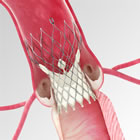Although the sub-group was relatively modest in size (115 TAVR; 111 SAVR), this is the first definitive data that has shown significant clinical benefit of TAVR over SAVR in this patient population. The primary endpoint of all-cause mortality or major stroke at one-year was 11.4% in the TAVR group vs. 21.8% for SAVR group, and reached significance with a p value of 0.04.
Although not reaching statistical significance, there also was a trend towards a survival advantage (TAVR 90.4% vs. SAVR 81.9%, p=0.06) and cardiovascular mortality (TAVR 7.0% vs. SAVR 13.8%, p=0.10). The data also showed reduced complications for TAVR, including lower rates of acute kidney injury (5.3% vs. 16.3%, p=0.007), life threatening or disabling bleeding (14.0% vs. 43.5%, p<0.001), as well as lower MACCE.
The CoreValve, manufactured by Medtronic plc, was approved last June by the U.S. FDA for use in patients at high risk for surgery. CoreValve received the European CE Mark in 2007 and has been implanted in over 70,000 patients worldwide.
Medtronic Study Finds CoreValve® System Benefits Aortic Stenosis Patients with Prior Coronary Bypass Surgery
Analysis is First to Show Significant Advantages for Transcatheter
Aortic Valve in Patients with Prior CABG
January 28, 2015 -- Dublin and San Diego -- Medtronic plc (NYSE: MDT) revealed new one-year clinical data showing that transcatheter aortic valve replacement (TAVR) with the self-expanding CoreValve® System offers advantages in survival and safety compared to surgical aortic valve replacement (SAVR) in high risk aortic stenosis patients who have previously undergone coronary artery bypass grafting (CABG) surgery. This is the first analysis to evaluate a self-expanding valve in prior-CABG patients within a trial of TAVR and SAVR.
Presented at the 2015 Annual Meeting of The Society of Thoracic Surgeons (STS), the post-hoc sub-analysis of the High Risk Study of the CoreValve U.S. Pivotal Trial included 226 prior-CABG patients who were either treated with TAVR (N=115) or SAVR (N=111).
At one year, there was a significant difference favoring TAVR with CoreValve in the combined primary study endpoint of all-cause mortality or major stroke with an incidence of 11.4 percent in the TAVR group vs. 21.8 percent in the SAVR group (p=0.04). Additionally, there was a trend towards a survival advantage for patients who received TAVR with CoreValve compared to SAVR (90.4 percent vs. 81.9 percent, respectively; p=0.06) and lower rates of cardiovascular mortality (7.0 percent vs. 13.8 percent, respectively; p=0.10).

John V. Conte, MD |
"Prior to now, the treatment of this patient population has been confounded by the lack of data showing clinical benefit of TAVR versus surgical aortic valve replacement for prior-CABG aortic stenosis patients, who may have increased risks of mortality and morbidity with re-operation.," said John Conte, M.D., professor of surgery at The Johns Hopkins Hospital who presented the data at STS. "The CoreValve System demonstrated important clinical advantages including faster recovery compared to surgical valve replacement offering heart teams an alternative to open heart surgery for this patient population."
The analysis also showed reduced complications for patients receiving TAVR vs. SAVR at one year, including lower rates of acute kidney injury (5.3 percent vs. 16.3 percent; p=0.007), life threatening or disabling bleeding (14.0 percent vs. 43.5 percent; p<0.001), as well as lower MACCE with the TAVR-treated patients (17.5 percent vs. 28.1 percent, respectively; p=0.05). There was no difference in the overall rates of all stroke (10.6 percent vs. 14.3 percent, p=<0.40) or major stroke (8.8 percent vs. 6.6 percent; p=<0.54) between the two patient groups
"Through our robust clinical trial program, we've been able to address important unanswered questions about optimal treatment with TAVR," said Rhonda Robb, vice president and general manager of Heart Valve Therapies at Medtronic. "The favorable outcomes from this analysis add to the growing body of clinical evidence that reinforce the positive performance of the CoreValve System, which to date is the only TAVR device to demonstrate significant clinical advantages in this important subgroup of high risk patients with prior-CABG procedures."
The CoreValve System is available for use in the United States, following U.S. Food and Drug Administration (FDA) approval in 2014 for patients at extreme risk and high risk for surgery. Since receiving CE (Conformité Européenne) Mark in 2007, the CoreValve System has been implanted in more than 70,000 patients in more than 60 countries. In addition, the CoreValve System offers the broadest range of sizes available to accommodate more patients.
In collaboration with leading clinicians, researchers and scientists worldwide, Medtronic offers the broadest range of innovative medical technology for the interventional and surgical treatment of cardiovascular disease and cardiac arrhythmias. The company strives to offer products and services that deliver clinical and economic value to healthcare consumers and providers around the world.
About Medtronic
Medtronic plc (www.medtronic.com), headquartered in Dublin, is the global leader in medical technology - alleviating pain, restoring health and extending life for millions of people around the world.
Any forward-looking statements are subject to risks and uncertainties such as those described in Medtronic's periodic reports on file with the Securities and Exchange Commission. Actual results may differ materially from anticipated results.


